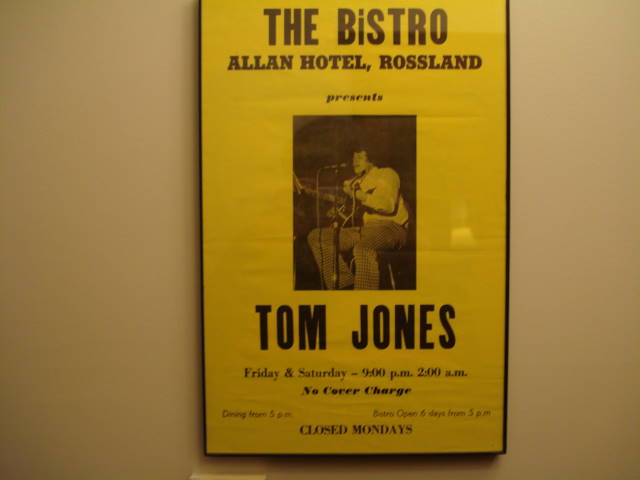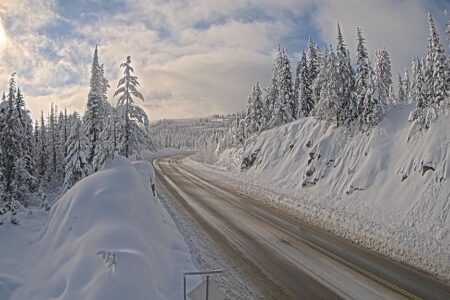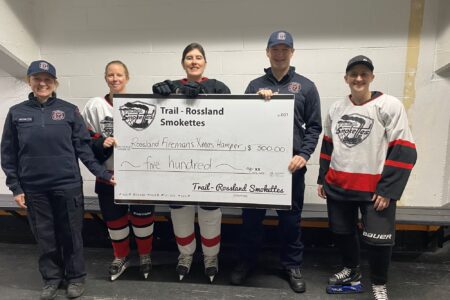Tom Jones & Winterland: a story of original residents and a world-wide Rossland based entertainment company
We’ve all heard of Tom Jones, right? Welsh-born crooner, swoon-inducing songster famous for 1970s hits like “She’s a Lady”? He’s actually a bit before my time, but his Wikipedia page makes for some interesting reading if you’re into salacious Hollywood soap-opera type stuff. The Mountain Kingdom has its own Tom Jones, and spending one hour with him was far more interesting than the four minutes I spent on the other Mr. Jones’s wiki page and I didn’t hurt my eyes once by rolling them repetitively. Our Tom Jones did not need to impart to me juicy Hollywood-esque dirt in order for me to to have one of the most enjoyable hours of conversation I’ve had in a long time (don’t tell my cat). Tom was initially described to me as “the firewood guy” and indeed, you can see him driving around town in his white Winterland truck full of firewood. This is very unassuming, yet firewood and the procurement and delivery thereof is merely the tippiest tip of a huge iceberg that is the life and times of Tom Jones. A scion of original Rosslanders and also the descendant of Scottish minors, Tom’s maternal great-grandparents, the Nicholsons, arrived in town in 1894. His paternal grandfather, Harry “Pop” Jones, was one of Britain’s Home Children and came to Rossland from Nanaimo. He was the superintendent of the Centre Star mine for a time around the turn of the 20th century. But as the mines’ production decreased over the years, Pop Jones had to go elsewhere for mining work, and he left his family of five children in the care of sister Maude and her husband, Jim Hardy. Jim was an undertaker by trade, and it was through him that Tom’s father learned to be an undertaker himself. Nifty historical note #1: The Sunshine Cafe used to be funeral parlour owned by a guy named Mr. Harper. Tom’s dad became a bit of a jack of all trades. Not only was he an undertaker, he also worked in forestry, and he had a a penchant for furniture. After deciding to go into this business in addition to the funeral business, he built a furniture store on the corner of Washington and First, a building now known as the Legion, but at the time was called Russell Jones Furniture. Additionally, he built two houses on First, one across the street from the furniture store/Legion which Tom still lives in, and one across the street and down a few doors, which was a funeral parlour. The outbreak of WWII in 1939 necessitated some diversification in Mr. Jones’s business plans. He owned 40 acres in Sheep Creek, a patch of land full of cedar poles, and so Jones Ties and Poles was born. He built the sawmill in Paterson, and this was where Tom grew up. “It’s the oldest operating business in this town,” Tom told me, even though the sawmill changed ownership in 1978. Nifty historical note #2: From what Tom is aware of, the name Paterson came from a Remittance Man of that name who came to the valley way back in the day, became an MLA, and finagled having the settlement and the border crossing named after him. “But that could be wrong,” Tom cautions. From an early age, Tom’s passion was music. He played the trumpet in high school and also learned the guitar. He wrote songs and sung, and after working in the local mine for a year after high school, he went to Spokane to attend business school, and he began playing music in bars there. “It was pretty contemporary. Beatles and Dylan, all that good stuff.” The situation in southern Asia brought Tom home after he finished business school. “They [the US government] decided I needed a sabbatical in Viet Nam, which I disagreed with, so I came back here.” At the business school, Tom also received training in computer programming. As it would turn out, all these elements – a knowledge and passion for music, a business degree, and computer training – would help turn Tom’s entertainment booking agency, Winterland Entertainment, into a thriving multi-million dollar business run out of the third floor of the Bank of Montreal building. It started out humbly enough. “There really was nowhere to play, there were no venues,” Tom, who played and sang in a band called Winterland, remembers. “But it was kind of starting to happen. This guy moved to town and bought the Allan Hotel. A Mr. Neil Schnieders. He applied for a cabaret license and he started asking around town if there was someone who could play and sing, and he phoned me up one day. I played by myself for three years and then put a band together. And that’s how I started in the booking business.” With his band assembled, Tom went on the road, leaving a entertainment hole at the Allan Hotel. Tom filled this by booking bands there he knew from his time on the road. Nifty historical note #3: Tom booked both bands, Raven and Ember, who were at the Allan Hotel during its famous fire of 1978. Winterland Entertainment ballooned into a business that employed nine people here in Rossland, two at an office in Penticton, and five in an office suite in the Century Plaza Hotel in Vancouver. He produced concerts, employed DJs, set up sound systems; in its heyday, Winterland Entertainment had anywhere from 125 – 150 bands on the road at one time. In the late 1970s and before the big recession of the 80s hit in 1981, Tom’s company was producing 100 major concerts a year in western Canada, for names like Roy Orbison, Chubby Checker, Ian & Sylvia Tyson, and Bruce Cockburn. “But the best show, or the most profitable show, I ever produced was called the “Trilogy of Elvis,” says Tom. “I did that show for about three or four years. One guy did Elvis in the early years, the next guy did the middle years, and other guy did the last years when he was fat and all that stuff. And there was a fourteen-piece band.” Tom laments, “See that’s the difference! You don’t see anything like that anymore. That’s why people don’t go out, there’s no spectacle.” The success of “Trilogy of Elvis” as a travelling show was a sign of the times. “That was a really good show, and I used to run it for three to four months out of the year, and they played six nights a week in ballrooms and auditoriums.” 1980 and 1981 were “screaming”, according to Tom, but in October 1981, things took a turn for the worse. “It was like someone turned off a tap. And by February 1982, 50% of the hotels in BC were in receivership.” In addition to the rapid economic downturn, Tom credits changes in drinking and driving laws, changes in demographics, music videos changing the expectations of fans, and the punk rock bands who started, in his view, bringing drugs and debauchery onto the scene with the eventual demise of Winterland Entertainment. Not to mention the quality of the music taking a nosedive as well. Rossland’s Tom Jones says back in those crazy days of Winterland Entertainment’s peak in the early 80s, he could have lived anywhere if he’d wanted, much like the more famous Tom Jones does. But his roots were here and his children were here. Nowadays, he says, “You know what? In this day and age, I can’t see the advantage to living in downtown Vancouver or downtown Toronto, or New York or anywhere else. I have access to everything they do, and for a lot less money, and no traffic.” Tom still has his hands in music, saying that he gets over 1000 CD submissions a year, although 99% of what he hears “is crap.” He has his fingers in a few other pies as well, but for the most part, Tom does the firewood thing, which, he says, “is something to do.” From one of Rossland’s original familes to a world-wide entertainment business based in his hometown and back to his roots again, Tom Jones is nothing if not a fan of the Golden City and a great example of Rosslander’s humble yet pioneering spirit, and that’s more than I can say for the other Tom Jones out there.
























